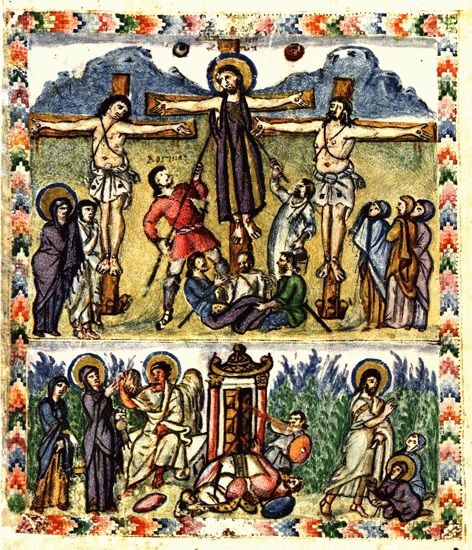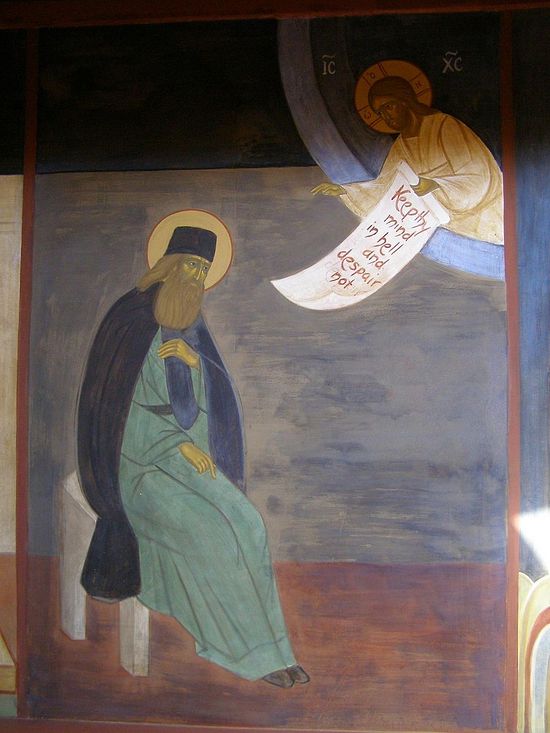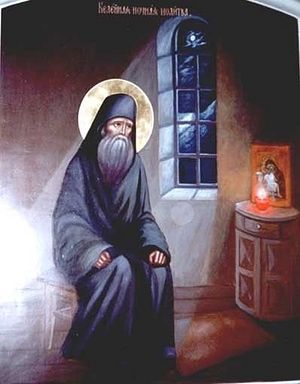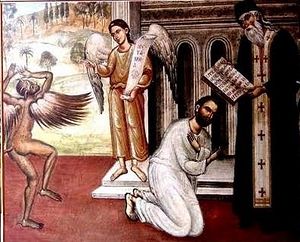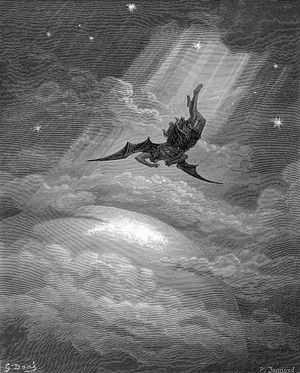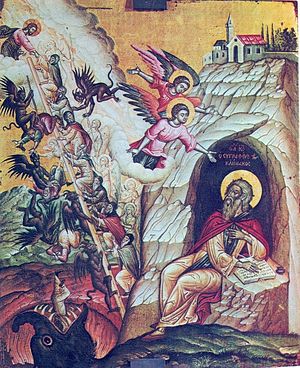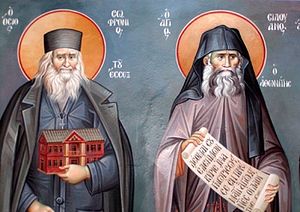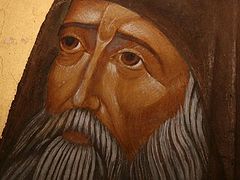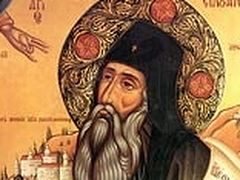The now famous saying, “keep thy mind in Hell and despair not,” is a word given by God to St. Silouan one night as he struggled intensely with demons. Six months after going to the Holy Mountain St. Silouan was blessed to experience a vision of Christ in glory, in which he experienced the full Christ, and the life of Christ. Eventually he felt this grace subsiding and so he dedicated himself to extreme ascetical struggles in hopes of attracting the grace of God again. One night, fifteen years later, mentally and spiritually exhausted, St. Silouan wanted simply to bow before Christ in His holy icon, but a terrible demon stood in his way, and he heard from God in his heart, “The proud always suffer from demons.” When he asked God how to defeat pride he heard again in his heart, “Keep thy mind in Hell and despair not.” From that point on he practiced this and humbled himself to the extreme, and he became so acquainted with the practice that he could go there with but a movement of his soul. Fr. Sophrony[1] says that ultimately this state is impossible to describe—one can only really know it by experience. Even amongst those who have experienced it, St. Silouan’s experience is unique in that even his body experienced the fires of Hell, as it was a charismatic gift from God which corresponded perfectly to his state.
Ultimately, keeping one's mind in Hell is about learning humility—through self-condemnation, while keeping hope because we know that God is good and desires the salvation of all men. Fr. Zacharias[2] believes that this word is given by God to St. Silouan for our entire generation which suffers from pride, the darkening of the mind, wickedness, despair and despondency, as he states in The Enlargement of the Heart. The vision of Christ in glory is our life—it is the purpose of life and the true life of man. St. Symeon the New theologian says that if you do not desire to see Christ then there is something wrong with you and St. Gregory Palamas says that the sign of a healthy soul is the vision of Christ. Thus this practice of keeping your mind in Hell and despairing not is vital for our generation which is so spiritually lacking.
In receiving a vision of God, one shares in His very life, His grace, and His glory, and it becomes his own. Thus the vision of Christ in glory is a taste of Heaven on earth, and so, comparatively, the loss of this grace is Hell. Those who have had this grace and lost it were never the same again, and could never live the same life again—they were focused on a higher calling. But to never have had the experience at all, to never have truly known God, is the far greater grief of never having attained to the very purpose of our lives. Keeping one's mind in Hell is about acquiring humility in order to receive and keep grace. Peter, James, and John beheld the glory of Christ on Mt. Tabor but fell on their faces and had to look away. After Pentecost they beheld Christ in glory but did not fall on their faces—they had become better prepared to receive the glory of God. There must be an effort on our part to demonstrate that we desire the grace of God in knowledge and understanding because God respects our free will. In seeking His glory we exercise our free will to overcome our sinful nature and to raise our existence to divine heights, and this is a manifestation of, and indication of the fact that we have been created as hypostases in the image of Christ—the great hypostasis of the Son and Word of God. It is with an infinitesimally small effort on our part that we can attract the grace of God.
We need humility to acquire and keep the grace of the vision of Christ because He Himself is meek and lowly of heart, and we do this through repentance, which St. Gregory Palamas says is the beginning, middle and end of the Christian life. St. Silouan was given a vision directly from God, but for others, we must be willing to live the life of the person who revealed it to us in order to acquire it again. One must be unsparing on oneself in “self-hatred” and self-condemnation. An example of this is Nicholas Motovilov who suffered much after experiencing the uncreated light through St. Seraphim of Sarov and later losing that grace. This self-condemnation is our source of inspiration, renewal and ultimately of our theology—it is the way of the Cross. The Saints are those who have preferred to die rather than lose any grace. Our love for God must become greater than our fear of death, and until that time the passions will continue to have a hold on us. We must meet Christ at the foot of the Cross, because He descended in order to ascend and raise us up—to grant us our own Pascha.
As Christ descended before ascending, so this too is our path. To learn God’s specific will for us we must make an inner rejection of everything that is of us—all our knowledge, desires, plans, etc—and turn our hearts to God in prayer before doing, thinking, or saying anything. In this we imitate Christ’s self-emptying and obedience, even unto death. There is no vacuum in the spiritual life—if we empty ourselves for the sake of Christ then He will fill us up with Himself. We descend by seizing on those things that humble us and accepting the shame they bring. There are many ways in which we can accept shame—especially in the mystery of Confession in which we should confess only that which most shames us, leaving aside all other details, as we are seeking a divine, rather than human, word. We can also accept the shame of false accusations and be the first to apologize for any offense even if we feel we were not to blame. In accepting this shame we enter into the mystery of Zaccheus who made a public spectacle of himself by climbing a sycamore tree in order to see Christ. He was willing to bear any ridicule that might come from it, but in doing so he placed himself on the path of Christ, and that day Salvation came to his house. Shame is beneficial as it brings a pain which helps us to realize we have a spiritual heart and to find it, so that we can speak to Christ from it.
It is through the Cross that joy has come into all the world, and so we will find joy through our own cross. Everything else in this world is tainted by the sorrow of death. This is the remembrance of death, and this acute awareness helps us to focus on Christ Who alone offers us life incorruptible. In focusing on Him we learn to place ourselves in prayer at the Cross, or the Last Judgment, and to have this remembrance of death in order to steer ourselves from passionate, especially proud, thoughts.
There are two basic ways that we may come to repentance. The first is to appreciate the futility of the pleasures of this life, and to see that we and everything shall die. God sometimes gives a grace that allows us to see the whole world as it really is, and to see that despite all its wonders it cannot help us, and this charismatic despair is remembrance of death. Sometimes, however, God gives repentance through the more positive experience of seeing the light of Christ, which immediately brings a radical change in the beholder, as is seen in the case of St. Paul on the road to Damascus.
The humble path of repentance, of self-condemnation and the way of the Cross includes discovering God’s will through holy obedience which St. Silouan considered to be a sacrament. He taught that to accept the first word from your spiritual father on any given subject is absolutely essential for receiving the living Tradition of the Church. Obedience follows the way of Christ and leads to true prayer of the heart. When one is obedient he feels the presence of the Spirit in his soul and knows that his sins are forgiven, but when one is proud he knows neither. When one is obedient evil does not entice him and he is not judgmental, and so he can place himself below even one who abuses him, and ask for mercy through his abuser’s prayers, and in this way descend along the path of Christ. Feeling the Spirit in one’s soul is a witness that the soul will not die, and likewise, beholding the face of Christ is salvation. The Patriarch Jacob said For I have seen the face of the Lord and my soul shall live (Gen. 32:30). Those who have the vision of Christ emerge with a deep love for all of creation and a martyric desire to suffer for Christ—to accept the way of the Cross.
To follow the Lord’s path it is expedient to have humble thoughts of self-condemnation, even condemnation unto Hell, because then we have no room for evil and judgmental thoughts. By this we come to truly see ourselves as the chief of all sinners because we have no time to look at the sins of others. By this we also keep the demons away because they cannot follow us into humility. Satan always wants to go up, and this is why he fell from Heaven, but the way of Christ and the Cross is to go down. Christ emptied Himself and came to earth as a human being, accepting hatred and mockery and ultimately Crucifixion for our sakes, and further descended into the depths of the earth to raise the dead. We too can descend into Hell, and not despair, because all things are filled with His presence and resurrection. The descent of self-condemnation was life-changing for St. Silouan, for he observed that it was when he stopped this practice that his proud thoughts returned.
The “prisoners” spoken of in Step Five of St. John Climacus’s Ladder of Divine Ascent are a perfect example of this. St. John tells us that in them he saw true repentance and humility such as few eyes ever see, and he called them “guilty yet guiltless men.” The prisoners were those who had experienced a great grace from God but had not been able to maintain this high spiritual state. However, having once known this grace they could not go back to their former ways of life—they had seen themselves in the light of Christ and thus realized just how far from Him they were. They say of themselves, “For we have not kept our vow spotless, but after Thy former loving kindness and forgiveness, we have defiled it,” and St. John describes their activities as “such deeds and words as can incline God to mercy; such activities and postures as speedily attracts His love for men.” They lamented over their own souls as for the dead and engaged in extreme self-condemnation and self-humiliation, for God resists the proud. Their words and deeds may seem very troubling to us today from a psychological point of view, but in the spiritual life everything is different. We must do whatever we must do to put ourselves in the humble, obedient path of Christ.
The prisoners had many ascetical practices. Some deprived themselves of sleep and chased away sleep with insults, others sat in sack cloth and ashes and struck the earth with their foreheads, and others wept fervently and beat themselves. Still others condemned themselves as unworthy of forgiveness, thus keeping their minds in Hell, and others deprived themselves of food because they believed they had acted as wild beasts. Some even requested to be denied the honor of a funeral (which the Abbot sometimes granted) because they were so wholly detached from anything created, including themselves, and from the honor of men, for self-love is the mother of all passions. Others even asked to be possessed by demons or to become blind, epileptic or paralyzed in hopes that they might attract the mercy of God and through their present sufferings be excused from the sufferings hereafter. St. John observed that their asceticism was so strict that their bones were withered and cleaved to their flesh, their knees seemed as wood from so many prostrations, their eyes were sunk into their sockets, they had no hair, and they were even indistinguishable from corpses.
They also practiced the remembrance of death. As St. John says, they had “the sight of death unceasingly before their eyes,” and they often wondered if their labors and prayers were worth anything, and how they would fair at the Judgment, but they were ultimately content with whatever God’s justice would bring them. They were not simply seeking to avoid punishments, although it is by voluntarily accepting punishment in this life that we can escape everlasting punishment, as God does not judge twice, but they truly desired to be repentant for the rest of their lives because it is in this repentant state that they can truly say, “Thy will be done.” Repentance allows them to enter into the mystery of complete obedience which is a safe place from the Devil and proud thoughts.
Although these practices are unimaginable for most of us today, St. John holds up these men as a shining example, and as blessed above many others. He tells us that their minds had already sunk to the very depths of humility and that the fire of their melancholy had burnt up all their tears, their grief eradicating their anger. Thus we see that by condemning and humbling themselves they burned away many passions. They kept their minds in Hell, but yet clung to the mercy of God. This state was purely a gift from God, bestowed once they had fully let go of themselves, to grant them protection against the enemy. It is important to note that all of their practices were done under obedience, and that without the protection of obedience such practices would surely lead to psychological and emotional sickness. St. John says that if we have lost former grace and virtues then our souls will gladly take up such ascetical feats and even kill themselves if we retain but a spark of love for God. This is of course in the same spirit of the apostles and martyrs who sought for the fullness of perfection in Christ, which is the essence of true Christianity. Ultimately, we cannot fully and truly understand the example of these men. Although we highly value our own ability to reason and scrutinize and analyze, it is pure folly to bring this passion into the spiritual life. The spiritual state of these men is far beyond my own and thus I have no right at all to subject their experiences to my own experiences. It is enough to ask God that their example might in some way be beneficial for my salvation.
The prisoners teach us that every experience, self-inflicted or not, can be turned towards God to accept the shame of the Cross. In all situations we can grab a humble thought and hold on because Christ is meek and humble and Satan cannot follow us into this safe “place.” For example, if someone insults us, we should not remember the wrong, but thank God for making us aware of our faults through another. This humility and acceptance of reproof and shame attracts the grace of God. This experience of turning all energy and situations towards God all takes place in our heart which is the deepest place of our being. If we are able to collect our mind from the world back into our heart we can then turn them both to God, which is the natural state of the heart and mind.
From the experiences of his own life, St. Silouan too learned that the heart is the arena of spiritual battle against evil and the enemy, and thus he dedicated the rest of his life, following the reception of his word from God, to acquiring the humility that he had tasted in his vision of Christ, for pride is the deepest root of sin. In God’s word to him, “Keep thy mind in Hell and despair not,” he learned that the humility of the vision of Christ in glory is an essential aspect of God’s love and Being, and thus through this word he learned the existential mystery of Being, as Fr. Sophrony teaches. St. Silouan had experience Hell many times before—he experienced the torments of Adam banished from Paradise after he lost the grace of his own vision—but the exhortation to “despair not” was new. After fifteen years of intense struggling to regain the lost grace St. Silouan was beginning to lose heart, and it was at precisely the moment of total exhaustion that God granted him the great consolation of directing all his ascetic efforts towards acquiring the humility that is the sign of the life of Christ.
As Fr. Sophrony says, he did not merely conjure up mental images of Hell, but rather he actually descended into the depths of the torments of Hell, and he did this over and over again to combat the pride that beset him, because in Hell every passion is “seared as with a hot iron.” To place himself in Hell he would say his “beloved song” in which he condemns himself alone to Hell, and this was a real experience of Hell which eventually took root in his heart, allowing him to renew the experience within himself at will. And once the torturous fires had destroyed his passionate thoughts and feelings he would recall Christ’s saving love towards us, thus eluding despair. Hell, according to Fr. Zacharias, is where we find ourselves in the separation from God which discloses sin, injustice, and spiritual poverty. This knowledge is a precious gift from God which brings about the beginning of humility through contrition. This helps us to prepare a place for God in our souls. Contrition also affords us the courage of seeing the depths of our own spiritual poverty yet remaining in the hope that God will have mercy upon us. This acceptance of our depleted spirituality through contrition helps to bring the mind to its natural state of union with the heart. Contrition, and thereby humility, is maintained by self-condemnation and especially condemnation to Hell, as we see in the examples of St. Silouan and the prisoners.
With his “beloved song” St. Silouan would thrust himself into the depths of Hell and then remind himself of God’s love, thereby defeating despair. Fr. Zacharias notes that almost every major prayer of the Church, and especially the pre-Communion prayers, follows this pattern of descent and ascent which is first given to us by our Lord Himself. This word of the Lord, “Keep thy mind in Hell and despair not” freed St. Silouan from his struggles with the enemy because it placed him on the path of the Lord which enlarges one’s heart and keeps one distant from the enemy. Depending on our own spiritual state we can focus on the first or second part of the Lord’s word. Those who are hard of heart can overcome their arrogance and soften their hearts by focusing on self-condemnation, while those who have been softened by other sufferings can emphasize the assurance of God’s mercy. Fr. Zacharias teaches that the sign that our method is working is that prayer goes well. The negative energy of the experience of Hell can be transformed by our attitude of self-condemnation into energy directed towards conversation with God, which conquers the passions. Through observing our spiritual experience and learning to discern the movements of our heart we can come to know which path we should follow and how to convert all energy into spiritual energy in any given situation.
Keeping one’s mind in Hell prepares one to meet Christ, which in this life we do first and foremost in the Divine Liturgy in the reception of the holy Eucharist, which is even higher than hesychastic prayer. Asceticism is the context that prepares us for the Liturgy and for after receiving the gifts, thus the Liturgy shows us how we should live at all times. How we live in the Liturgy, in anticipation of receiving the Lord, and in thanksgiving for having received the Lord, is how we should live our entire lives. The aim of the Christian life is to acquire the grace of God in our hearts and to hold onto it. As Christ Himself is humble, and humility is an essential aspect of the very life of God, so we too must learn humility. The path to humility is encapsulated in the advice that St. Silouan heard from God in his heart: “Keep thy mind in Hell and despair not.” Our generation especially struggles with pride and all of its trappings, and thus we have much to learn from the life of St. Silouan. Although his experience is ultimately indescribable—how exactly did he take himself, body and mind, into Hell, and what exactly is the experience of the fires of Hell burning away our passions?—his path of self-condemnation, of the Cross—of Christ, is the essence of the Christian life and thus must become our path if we too desire to see and know Christ, and to have the assurance of salvation of the Spirit in our souls.
